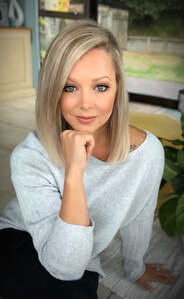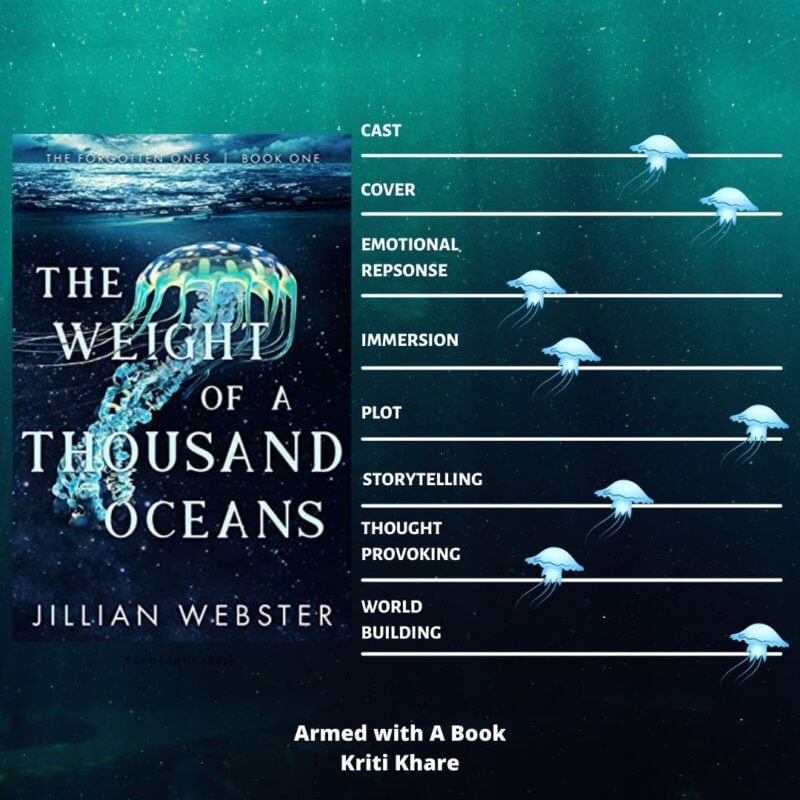Welcome to Armed with A Book, friends! As promised yesterday, I am back with my Q&A with Jillian Webster, author of The Weight of a Thousand Oceans. In my post yesterday, I shared about the book by highlighting aspects of the story that I particularly connected with as well as comparing it to another book that this one reminded me of. I hope you enjoy the interview!
The Weight of a Thousand Oceans

In a world where cities sprawl like half-submerged skeletons, Maia has spent her entire life hidden within the mountains of New Zealand. Her only companions being her ailing grandfather and a nomadic dog named Huck, Maia resents being alone. She spends her days wandering the ruins of a population long gone, dreaming of a place where the few humans left behind can start again—a place her grandfather insists is a myth.
But Maia cannot escape a strong and mysterious force calling her out into the world, as well as bizarre events following her around the island. There is something strangely enchanted about the land in which she lives… or is it her?
When Maia hears a rumor that people are heading to The Old Arctic Circle half a world away, she knows this is where her destiny lies—until a devastating turn of events seems to shatter any hope of reaching her destination. Clinging to the edge of her life, Maia must come face to face with the transformative power of fate, discovering the one thing she has spent her life running from may be the only thing to save her.
Content Notes include loss of loved ones, confinement, sickness.

Hi Jillian! Welcome to Armed with A Book, it is a pleasure to host you. The Weight of a Thousand Oceans is set in a post apocalyptic world where most of the world is submerged under the ocean due to climate change. When did you first start working on this book and did you always know it was going to be a series?
Hello, and thank you for hosting me! I started working on The Weight of a Thousand Oceans five years ago and published the first edition last year. I put it down many times throughout the four years writing it as it was a busy time in my life. I got married, we went backpacking around the world for three months, we adopted our first dog, and bought a house! Initially I planned on the book being a single book, where nothing occurs that couldn’t actually happen in real life … but, the book had other plans, and it ended up being a magical realism saga told over three books.
Maia is a strong character and I love her perseverance. She isn’t scared to take the leap and follow her gutt. Survival would be very hard without these traits. What was it like writing about a world that is so different from ours?
I love to read nonfiction and to research, so it was actually a lot of fun to write about this world. I studied a lot of library books and online research publications for three months before I started writing the first chapter.
Your writing conjured haunting images in my mind and as someone who does not swim, parts of Maia’s journey could easily feature in my nightmare. The expanse of the world, the horrible conditions parts of it are in… the submerged cities. I had so many vivid images in my head! Were you always good at writing this way or is this something you developed over time? Do you usually visit similar places that you are writing about?
That’s an interesting question. I suppose a part of writing this way comes naturally. I wrote a travel blog before writing my first book, and was told with the first book (a travel memoir) that people felt like they were in each of those places with me. I also know, as with most things, practice makes perfect. I’m by no means perfect, but I do believe my writing is improving with practice!
There are lots of little things and places woven into the books that are inspired by places I’ve been or experiences I’ve had. But I would say most of the places in the three books are places I haven’t spent much (or any) time in, with the exception of New Zealand.
Cassidy’s story is likely closer to women today, like myself, who pursue their career first and want to have a family when they are more financially stable. While in the West there might not be the same pressure to have kids (I grew up in India and understand the obligations there), how does the freedom to pursue a career affect the choice to have children?
That’s an interesting question. I suppose a part of writing this way comes naturally. I wrote a travel blog before writing my first book, and was told with the first book (a travel memoir) that people felt like they were in each of those places with me. I also know, as with most things, practice makes perfect. I’m by no means perfect, but I do believe my writing is improving with practice!
There are lots of little things and places woven into the books that are inspired by places I’ve been or experiences I’ve had. But I would say most of the places in the three books are places I haven’t spent much (or any) time in, with the exception of New Zealand.
This book reminded me of a number of books, all from different genres. The beginning of The Weight of a Thousand Oceans was like The Bear and what it means to live without society. When we started to learn about pockets of society around the world, I thought of The Book of M. Firewalkers is a recent book about climate change. What are some of your favorite books about climate change that you would recommend your readers to pick up next?
You know, writing climate fiction is a new thing for me, and I have to admit, I haven’t read much of the genre. I also find it very difficult to read other people’s books when I’m writing my own. I don’t want their writing style or scenes to influence mine, so I’ve stuck to mostly nonfiction books while writing this trilogy. Most of the books that people say my book reminds them of, I have not read. Which I find fascinating!
However, I am currently reading The Impossible Resurrection of Grief by a New Zealand author Octavia Cade, which is climate fiction. Her use of language is effortlessly poetic!
The Weight of a Thousand Oceans was originally published in 2020. What kind of changes did you make for the recent re-release of the book?
I always knew that I wanted to add the first few chapters of Book Two of The Forgotten Ones, The Burn of a Thousand Suns, to the end of the first book so that readers could continue the experience and get a little taste of the next book right away. I also added book club questions, a feature I’ve always enjoyed in a book.
How many years in the future do you think The Weight of a Thousand Oceans could take place?
This is a great question! I don’t ever say or give clues as to when this story takes place. I think the story is more powerful without that detail. But considering how quickly the projections from 2014 (from the Intergovernmental Panel for Climate Change) that I studied are already coming true, I would say maybe 75-100 years?
What’s next in store for Maia in the next book of The Forgotten Ones series, The Burn of A Thousand Suns?
Maia is in a whole new world in the next book. The story is bigger, darker, and full of suspense. Maia grows a lot in who she is, and there are a few twists and turns that even I, as the author, wasn’t expecting!
What is one thing you would tell Maia as she progresses through her journey and learns about her destiny?
I would tell her exactly what her mother told her towards the end of the first book. Follow your gut. Listen to your heart. Never give up!
Reading Experience and Review Link

Thank you for hanging out with me and Jillian today! Connect with her on Goodreads, Instagram and Twitter. Learn more about her on her website.
If you are curious to read about what the future may hold for us as our resources deplete and climate change continues, give The Weight of a Thousand Oceans a chance! I’ll be back with the review of the next book in the series in a few months.
Cover Image: Cover image: Photo by Tim de Groot on Unsplash

Be First to Comment